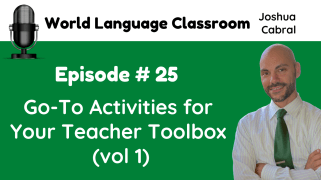Do you have a deck of regular playing cards? Yes? Well, you’re all done and the activity is ready to go.
This is a no prep activity that you can pull out at any time, on any topic, for any language at any proficiency level.
I call this activity Special Card (La Carte Spéciale, La Tarjeta Especial).
Here’s how it works:
- Choose one card from the deck before beginning and write it down on a piece of paper. Don’t show it to students. Keep the card in the deck
- Put students into groups of 3 or 4.
- Groups will need a piece of paper or small white board if you are focusing on writing. No need if focusing on speaking.
- Tell students that they will get a question and will either respond orally or in writing. If responses are spoken each group will need individual questions each round. If it is in writing all groups can get the same question for the round.
- I make up the prompt on the spot based on the topic. You can do this in advance, but I like to keep it “no prep.” It can be novice level questions with single words answers all the way to higher levels with questions about a reading or video.
- If the response is correct, hand the group a playing card. Their points for the round are the value of the card.
- Ace is 1 point, number cards (2-10) are their face value, a Jack is 13, a Queen is 11 and a king is 12. [The Jack, Queen & King values are arbitrary. You can make them what you would like.]
- Once all cards are earned, and the deck is depleted, groups add up their points. The final move is to reveal the Special Card, which is worth 25 or 30 additional points. The group with that card earns the additional points.
- The group with the highest points wins the round.
- Collect cards back. If there is time to play another round groups can continue with their points from the previous game or start fresh.
- If you’re playing additional games, be sure to choose new special cards each time.
The topics and proficiency levels are open depending on what you are doing in your class. Here are some prompt ideas
Novice Low-Mid:
- What are three colors, animals, days, months, seasons, articles of clothing, activities, etc.
- Questions about concrete vocabulary themes that require a 1-2 word spoken or written response.
Novice High:
- Where do you …?
- When do you …?
- What are your opinions about…?
- Questions about concrete vocabulary themes that require a sentence of chunked spoken or written language as a response.
Intermediate Low:
- Describe….
- Sentence level questions about details in a story
- Questions about personal or story details that require a complete spoken or written sentence response created by the group.
Intermediate Mid:
- Explain…
- Tell me about…
- Why…
- What is…
- When did
- When will…
- Questions on themes covered in the current unit that require 2-3 spoken or written sentences that are connected by transition words.
Intermediate High:
After groups read a passage together on their own…
- Specific or general questions to demonstrate understanding
- Questions on themes covered in the reading that require 3-4 spoken or written sentences that are connected by transition words and may require speaking or writing in various time-frames.
I also talk about this activity on episode 25 of the World Language Classroom Podcast.











Pingback: 25: Go-To Activities for Your Teacher Toolbox (vol 1) | World Language Classroom
Do the teams take turns with the questions or you give the question/prompt and all teams answer at the same time to their group.
If only one group is answering each time, do you rotate through groups or first with hand up or how does it work?
Each group gets an individual question when speaking. That minimizes the number of questions needed. I usually do a mix of writing and speaking so that groups stay involved. Play around with it. Perhaps it would work to award the card to the first team to respond when doing speaking prompts.
¡Brillante!
Thank you very much for this idea. The game sounds exciting especially in my classes with lots of athletes, they love competition and winning.
The breakout of skills by performance level helps my students have a clear idea of where they are and where they want to be.